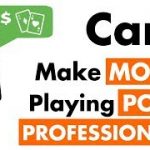Poker Tips Video Source & Information:
7 Tips for Quitting Your Day Job to Play Poker
Quitting your day job to become a professional poker player is a significant decision that requires careful planning and execution. Here are seven important steps you can take to help make this transition:
Assess your financial situation: Before quitting your job, take a hard look at your finances. Consider your monthly expenses, your savings, and your potential earnings as a poker player. You want to make sure that you have a sufficient bankroll to sustain yourself through any dry spells. A general rule of thumb for the minimum bankroll size in Texas Hold’em is to have at least 20-30 buy-ins for the level you are playing. For example, if you are playing at a $1/$2 No-Limit Hold’em table with a $200 buy-in, you should have a bankroll of at least $4,000 to $6,00
Start small: If you’re new to poker, don’t quit your day job just yet. Instead, start by playing low-stakes games and gradually work your way up. This will help you develop your skills and build your bankroll. You will likely want to play at the 2-5 level if you jump all in. A good player can make $80 an hour at this level.
Build your skills: Poker is a skill game, and to be successful, you need to continuously work on improving your skills. Study the game, read books, watch videos, and analyze your hands to identify areas for improvement. Check out our how to study GTO video here.
Find a mentor: A mentor can provide you with valuable guidance and advice as you navigate the world of professional poker. Look for someone who has already made the transition successfully and is willing to share their knowledge with you. My mentor is Mikey! You can watch his videos here!
Network with other players: (rounders friends scene) Attend poker tournaments and meet other players. Building a network of poker players can provide you with valuable information, opportunities, and support.
Create a plan with a Timeline: (Get Graph) Create a realistic plan that outlines your goals, strategies, and timelines. Consider factors such as the number of hours you’ll need to play to make a living, the stakes you’ll play, and the games you’ll focus on.
Stay disciplined: As a professional poker player, you’ll need to be disciplined with your time, money, and emotions. Set limits for yourself, don’t play above your bankroll, and stay focused on your long-term goals.Mikey says if you are playing cash regularly for 2-3 months you should be able to tell if your profitable, So get an app and keep track! If you are not winning over two months it’s time to take a step back and look at your leaks!
Quitting your day job to play poker can be a risky move, but with careful planning and execution, it can also be a rewarding and fulfilling career. Remember to always keep learning and adapting to the ever-changing poker landscape. Also, remember that playing poker for a living might seem fun and luxurious. Realize though that you keep very late, highly stressful hours. Casinos are smokey, and if you live in vegas you have to be on the strip. Which is probably where the zombie apocalypse will happen. I hope you enjoyed this video. Please subscribe for more great poker tips!
(las vegas Zombie scene
Sub in clips from rounders
Source: YouTube







